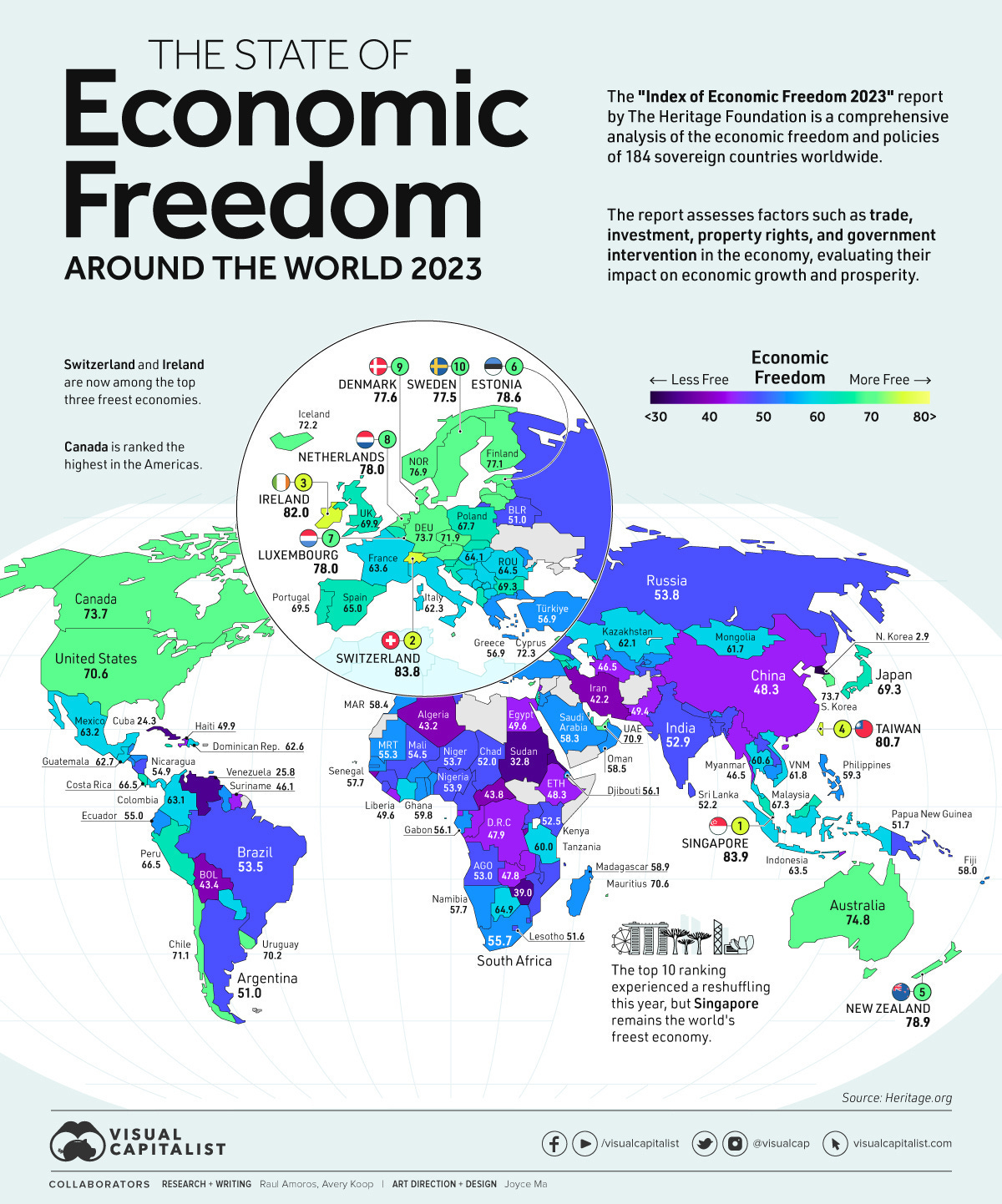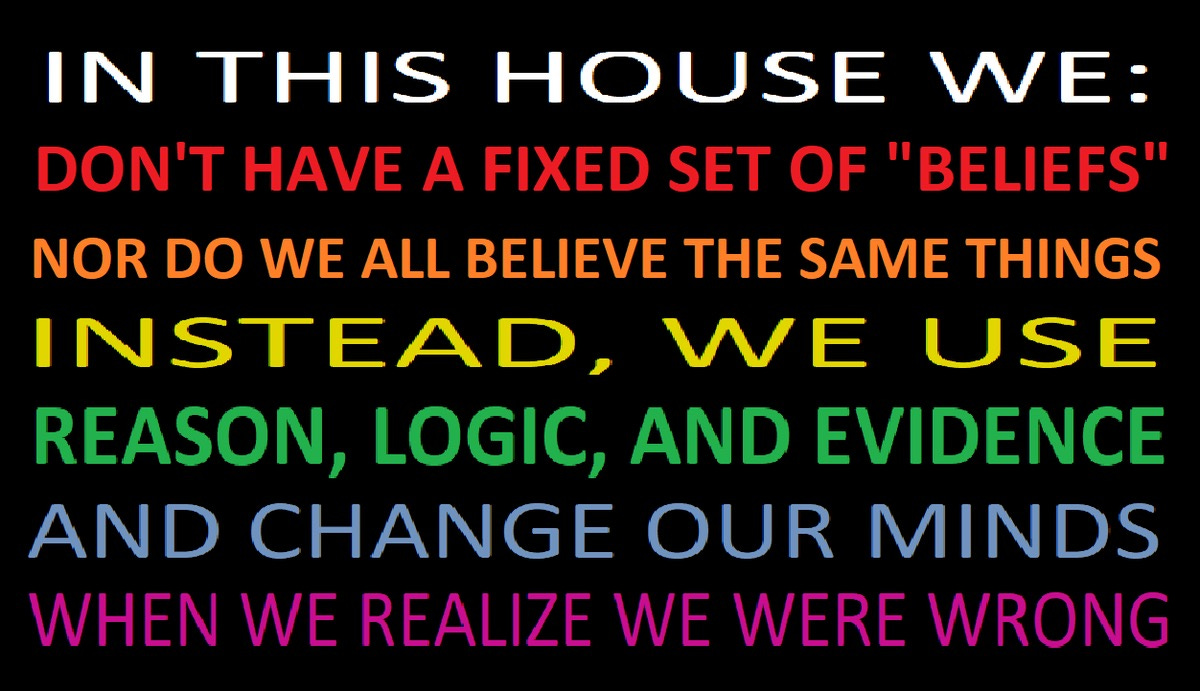Am I a Democrat or a Republican?
The case for going label-less.
We all want a strong economy. That’s what gives us all jobs and pays us well and both Republicans and Democrats want this. (73% of Americans want this.)
I tend to think a freer market economy is better at creating a more prosperous society since the countries with the freest markets in the world are among the best to live in, and that must make me a Republican.
But I think workers should get richer as the economy does, not just executives and the already wealthy, and most Americans agree with me there (employee ownership has Republican and Democratic support in Congress).
I also think we should use the wealth those economies generate to subsidize childcare, healthcare, and retirement like all of the other rich countries do, and there I lean Democrat. Though, I also wonder whether those things could eventually be provided by companies (or networks of them) like Mondragon currently does.
I’m also very into state-funded education all the way through community college, and that’s a Democratic ideal of the highest order. Though our current education system could be so much better and I see no reason why families shouldn’t be able to use that allotted funding for homeschooling or as a contribution toward charter, private school, or university education if they’d prefer it and that’s more of a Republican thing for some reason.
For the record: I don’t think every US state needs to provide this kind of structure, and I’d prefer that we give economic power back to the states who could decide to provide those things or not, and raise taxes for them or not. That’s how Europe works, and why shouldn’t we allow states to decide how they use their revenue just as European countries do?
I don’t think we should pollute the environment we live in and toward that goal I think we should phase out coal, oil, and natural gas in favor of cleaner energy sources like hydropower, wind, solar, nuclear, and geothermal, and that must make me a Democrat. But fracking, which produces natural gas, is so much better for our health and the environment than oil and gas and we can get it in the US rather than the Middle East, so I’m glad we’ve been phasing out those other two options in favor of this one and that must make me a Republican?
To be clear, I am very against the instances where fracking has poisoned waterways, but it seems we’ve learned how to not make that happen. And since fracking is just the process of using water to create veins in the earth’s crust (rather than drilling straight down), we can now use this advancement to reach geothermal energy! If we could tap into the earth’s never-ending furnace (as Iceland does) we could power the world with virtually no air pollutants, insanely minimal land use, and very little mining and resource extraction, while creating a stable energy source that would allow countries to develop and innovations to be made without negatively affecting the world we live in. Since I am very on board with this kind of future I suppose I’m sitting the fence on this one?
Fiscally I lean Republican, and most people do. We need to drastically reduce our national deficit because we’re spending $257 billion more than we make, our debt has ballooned to $35.96 trillion, and we are using taxpayer money to pay $1 trillion in interest every year which is a horrible use of our money. There can be no doubt we need to trim federal expenses, and I’m very for Republican attempts at doing that. In fact, I’d like to see the federal government get as small as possible so we can empower states to create the systems that support us rather than one large federal government, and that must make me a Republican. (But we’d have to give states the ability to also tax their economies and right now we don’t.)
As much as I think the American government could stand to trim a lot of expenses, we’re also going to have to earn more money by raising taxes, and that’s what the Democrats keep saying. One way to do that? Earn interest instead of paying for it—like Norway does. Their sovereign wealth fund was established in 1990 to invest surplus revenues from their oil and gas resources and divest from those industries altogether. They invested in more than 9,000 companies in 70 countries and limit annual withdrawals from this fund to 3% of its total value, which is now $1.8 trillion. Today this small country owns 1.5% of all stocks globally, with an investment portfolio worth $321,000 per citizen. This is an insanely good idea, and both Biden and Trump have tried to establish a sovereign wealth fund. Unfortunately, our debt puts us in an unfavorable position to do something like this—it would be like investing in the stock market at the same time that you’re trying to pay down credit card debt. That brings us back to: We need to cut expenses, but we also need to raise revenues so we can work toward a more prosperous future. I’m on both teams here.
Speaking of increasing tax revenues: I am still researching all of the best possible ways we can reform our tax code and my mind is not made up on those ideas yet. But one way we can increase our income is to open our country up for immigration. Both Democrats and Republicans are on board with skilled workers legally funneling into and contributing to our economy, paying for it with their tax dollars, and helping our economy grow and flourish. But illegal immigration makes us unable to do any of that so there I lean Republican. That said, I would also love to see refugee programs that support legal assimilation in places that can afford to support them, like Utah, with the goal of creating more American citizens and a bigger economy and a wealthier government that sustainably provides for all of us, and that makes me more of a Democrat (or a Utah Republican).
In a country as diverse as ours, I am still very for free speech because censorship has never worked well anywhere that it has been tried and that has somehow become a Republican issue. But in an era where a lot of what we read is decided by an algorithm and those algorithms are owned and operated by politically motivated wealthy individuals, I think platforms would be better served if they were moderated by us, putting us in the power to de-amplify niche worldviews as we do on Facebook Groups or on Substack, rather than allowing platforms to dictate what we read and see and what gets amplified. Digital spaces are like public parks, they can be pro-social or anti-social depending on their design and I think we need to design better digital spaces, which must make me a Democrat?
I suppose what I’m saying is: I want a very strong economy, but I want the equity in that economy to be owned by all of us. That would make the average American much richer, at the same time that it makes the average billionaire less rich. Then we could afford to tax everyone a little bit more, which means we’d pay down more of our debt, invest more of our money, and use those surplus incomes to provide enough of a safety net so people feel supported enough to do things like become entrepreneurs and be good parents and citizens and enjoy a good life.
If we can minimize the federal government in the process, all the better! States could manage their own economies and run the places we live better than our large federal government could. And if we hire people from other countries, they will become richer and spend more money in our economy, making our states and nation even wealthier while providing more benefits for the average citizen and increasing the number of people who can enjoy the good life too. If our companies act in the best interest of our workers and the environment we live in then we will live in a nice place and experience human flourishing and that’s kind of future I’m looking for even if that future is Democratic in some places and Republican in others.
I’m sure your laundry list doesn’t look the same as mine, but you probably have similarly conflicting beliefs that don’t neatly line up on one side of the aisle or another. A multi-party system might be better and we have good examples of that around the world, but I actually think we’d be better off talking about solutions instead of parties because sometimes Democrats and Republicans talk right past each other saying “I’m for the economy” or “I’m for the environment” as if those two things can’t go together and a lot of the time they can.
We need to be able to talk about the big picture—about what we are trying to achieve. We can get hung up on soundbites all day long, saying things like “tax the rich” because we see that wealth inequality is a problem and that seems like a good solution. But when we actually step back and look at what we want to achieve, we want the rich to earn less because their employees are earning more, not because they are giving more of their money to the government. The goal isn’t just a richer/bigger government, it’s richer people and communities, so maybe we should come up with bipartisan strategies that incentivize employee ownership and employee equity plans and increase the wealth of the average citizen and if we keep that end goal in mind maybe we can get more bipartisan support for it and create less of a wealth gap in the process.
Right now our labels are directly impeding our ability to make good choices, and trademarking an idea as Democratic or Republican is to instantly brand it as inoperable by half the population while clearing half our options off the table. Republicans loved Trump’s stimulus checks at the same time as they hated Biden’s Covid relief spending. They loved when Trump wanted to pull out of Afghanistan, but hated when Biden did it. Democrats criticized Trump’s excessive use of executive orders even as they loved Biden’s use of them. They criticized Trump’s border policies but thought them a necessity when Biden kept them.
The labels force us to see the world through a filter, one that is either good or bad depending on the person applying it. But if we remove the filters we can see more clearly, and if we focus on the solutions we want to create I believe we can find more consensus than if we look only to what one label wants to do or the other.
I am not a Republican or a Democrat. I am a person who is looking for solutions to the problems we are facing and I don’t care where my allegiance falls in pursuit of that. I am also apt to change my mind about all of the above as I research more and am exposed to better solutions and I’ve already done that over and over again as I continue to write this newsletter. So far, the only political sign I can get on board with is this one by Jason Crawford:
Maybe it’s naive to come to the point that we need to abandon partisan conversation in our most partisan time ever, but it’s the one I’ve got. And I think enough of us are sick of the alternatives to be open to exploring something better.
Let’s focus on the issues, on the needs of people, and on the solutions we want to achieve. Not which label we are using to achieve it.
I know I’ll keep doing that here.
Thanks for doing it with me,










There's a famous business phrase: "the only way to make money is bundling and unbundling."
We need an unbundling process in politics. I'm not sure how to solve this system wide, but on an individual level, I think that it starts with unbundling political parties from our identity.
Someone recently asked me "how are you friends with Trump voters?" (I live outside DC). My answer: "simple, I don't have a strong political identity and neither do my friends."
Very thought-provoking. Just want to set the record straight that the research of Bob Howarth on methane emissions—both in fracking fields and in “natural gas” infrastructure—puts the lie to this assumption: “But fracking, which produces natural gas, is so much better for our health and the environment than oil and gas.” Methane is up to 100x more powerful a greenhouse gas than CO2. His research and data show that fracking, all told, is actually worse than coal. There is no such thing as a fossil fuel “bridge to the future.”